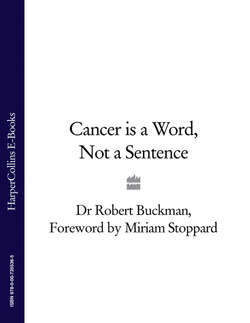Читать книгу Cancer is a Word, Not a Sentence - Miriam Stoppard - Страница 9
‘Cancer’ as compared to ‘infection’
ОглавлениеAs we all know, the infectious diseases cover a vast spectrum of seriousness, from the totally trivial to the lethal. At the trivial end of the spectrum is the common cold. We’ve all had colds. We all know that a cold is caused by a virus, of the type known as a rhinovirus, infecting the lining of the nose. We sniff and snuffle for a few days, then it goes away and we forget about it.
Think about another example of a virus infecting an organ and causing trouble: hepatitis B. Hepatitis B is an infection of the liver that is unpleasant and can sometimes be very serious. Then there are other viruses that are even more serious—for example Ebola virus or Marburg virus (both of which have very high mortality rates), HIV/AIDS or avian flu.
We would not dream of grouping these totally different diseases (the common cold, hepatitis B, Ebola virus and HIV/AIDS) together under a general diagnosis of infection. But think for a moment what it would be like if we did.
Try to imagine the world as it would be if we lumped all those diseases together, the terrible ones and the trivial ones, under the single label of infection.
The world of the single disease infection would be a scary world indeed. Anyone who developed a sniffle and a runny nose would not be diagnosed with a cold, because in this imaginary world we do not have that word to use as a diagnosis. Instead, they would be told that they have come down with ‘infection’.
Infection! Like those infection outbreaks that happened in Africa and India and killed all those people! The patient would panic and worry that the infection might next appear in the liver, or the blood system, or the immune system, or maybe all of them! Perhaps this episode of runny nose and sniffles is the beginning of one of those types of infections—the ones that overwhelm you and pose a serious risk to health or life!
The analogy is apt, even though I’ve made it sound a little ridiculous. When you lump different diseases together and you include diseases of greatly different behaviours under the same label, you increase the fear and the dread that the label brings with it.
This is what has happened with the cancers. By constantly referring to this large group of different diseases under the generic title of cancer we generate—even if it is only in the subconscious—a deep-seated fear and dread, and create a subtle premonition that somehow any of these two hundred different diseases, even a highly curable one, might mysteriously turn into one of the more aggressive ones.
By attaching the label of cancer to all those different diseases you subtly link them all together. The real problem is that by linking them together and lumping them under one label, you remove the predictability of the individual diseases and you create the myth of a single, unpredictable and changeable super-disease which can mysteriously leap from one type of disease to another. I’m now going to show you that cancer is a process, in the same way that ‘infection’ and ‘inflammation’ and ‘degeneration’ are processes, not diseases in themselves.
Our reaction to a diagnosis of a cold or the flu would be fear and dread if we thought that the prognosis might actually be serious, because ‘everyone knows that infection can affect the liver/blood/immune system next’. Lumping together all those conditions that behave so differently into one group would create the myth of a single and totally unpredictable condition. The mere mention of the super-disease infection would terrify and paralyse anybody who started getting a cold.
It’s the same with the cancers.
When you lump all of the different cancers together as a single mysterious disease that you then call by the one name cancer, the predictability of the various different cancers is lost. And there is a tendency to dread any of the cancers with the same fear and sense of doom attached to the most serious of them: cancers of the skin seem to be somehow linked to cancer of the pancreas.
When predictability is lost, fear and panic rush in to fill the vacuum.
Now it’s not quite as cut-and-dried with the cancers as it is with most of the infectious diseases. Each of the cancers does carry with it some unpredictability—although it is usually pretty limited. Although most cancers are not totally predictable, there are well-known limits to that unpredictability. We cannot predict everything, but that doesn’t mean that we can’t predict anything! It is possible to predict the future, as far as possible, with each separate cancer, and to know which factors are important in each disease in predicting its behaviour and the chance it will spread. So maybe the comparison with infections is fair after all. We know that a cold won’t last six months, but we can’t predict whether it will be gone in five days or ten days.
Having established that all two hundred (or more) cancers do share a common process, let’s start by taking a look at that process itself.
